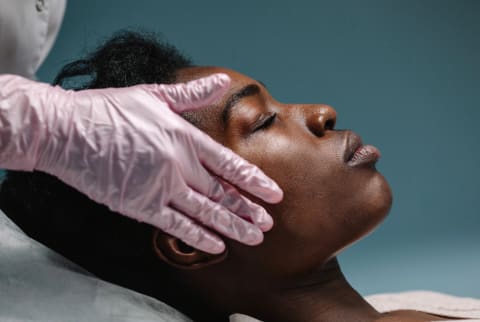Advertisement
You Just Got Acupuncture—Now What? An Expert Guide To Post-Acu Care


Getting acupuncture done fills most people with a warm and fuzzy sensation, and leaving the office might feel like being on cloud nine. The sun seems brighter, and the grass is somehow greener. Someone just cut you off in line? Instead of feeling pissed, you simply shrug and go on with your day.
We acupuncturists like to refer to this as the "acu-high”—a perk that happens when the parasympathetic nervous system is activated. Here's what you need to know about this feeling and how to support your body after acupuncture to keep it going for as long as possible.
What you can expect to feel after an acupuncture session
During an acupuncture session, a number of mood-enhancing hormones and neurotransmitters1 are produced.
Serotonin2 floods the system, and this happiness hormone can temporarily boost our mood, improve digestion, promote sleep, and support clear cognitive function. Endorphins3 are also released, which can ease physical pain and discomfort. Meanwhile, levels of cortisol4, the stress hormone that contributes to symptoms of anxiety and depression, are reduced.
To most people, this will feel great! There are, however, some folks who will feel lousy after their first acupuncture session or like their symptoms have been amplified. This is especially true for people who are highly sensitive or tend to internalize their emotions and have unprocessed trauma and/or prolonged disease and toxins stored in the body.
If this happens to you, don't freak out! It's also a natural reaction to have after acupuncture begins to move all that stagnant chi around in new ways. Simply report the symptoms to your acupuncturist, and your future sessions can be adjusted accordingly.
What to do (and not do) after getting acupuncture
No matter how you're feeling, there are a few things you can do to take care of yourself immediately after an acupuncture session to make the most of your treatment. Here's the post-acu plan that I recommend to my patients:
DON'T do a rigorous workout
Do not go to a challenging HIIT class immediately after acupuncture. Acupuncture works to speed up your blood and chi circulation, so adding on physically straining exercises can result in dizziness or over-exhaustion. Gentle movements such as restorative yoga are OK and even encouraged.
DON'T drink alcohol or caffeine
Acupuncture speeds up metabolic activities in the body, initiating the detoxification process. (Hence why it's super normal to have a bowel movement after a session!)
Hydrating with water before and after your session will further help flush toxins and move lymph fluids. On the other hand, caffeinated drinks and alcohol will dehydrate the body. Caffeine also activates the sympathetic nervous system5, countering the effects of acupuncture. And I don't need to emphasize the fact that alcohol taxes the liver.
To make matters worse, alcohol is a neurotoxin and an immunosuppressant6 that hinders the immune responses and nerve responses that acupuncture aims to optimize.
DO eat clean
Once your immune response is triggered and your body starts to eliminate toxins, try not to consume food that can become a burden on the system. Some examples are processed food, saturated fats, and sugary treats. Instead, opt for nourishing and light meals that will go easy on your digestion and provide space for the body to eliminate built-up toxins.
DO avoid stress as best you can
Maybe you feel rejuvenated after your acupuncture session and want to power through that work deadline. However, if possible, I'd recommend trying to keep stress to a minimum for the rest of the day. Many people report that acupuncture leaves their minds feeling light and clear. Putting yourself back in a stressful situation right away will trigger the sympathetic nervous system back into overdrive and is counterproductive to what we try to achieve in a session.
DO avoid the cold
If it is cold and windy outside, bundle up and stay warm after your treatment. Since acupuncture speeds up your circulation and puts your body into a relaxed state, you might become more sensitive, and it will be a shock to the system to be exposed to extreme cold.
The takeaway
Acupuncture is all about supporting the body and optimizing its metabolic processes so it can rebalance and heal.
After every session, a good rule of thumb is to enjoy some mindful connection with yourself: Get quiet, listen to your body, and show yourself some genuine self-love.
6 Sources
- https://link.springer.com/chapter/10.1007/978-3-642-10857-0_5
- https://www.ncbi.nlm.nih.gov/books/NBK545168/
- https://pubmed.ncbi.nlm.nih.gov/15135942/
- https://www.ncbi.nlm.nih.gov/pmc/articles/PMC6825666/
- https://journals.plos.org/plosone/article?id=10.1371/journal.pone.0165034
- https://www.ncbi.nlm.nih.gov/pmc/articles/PMC4590627/